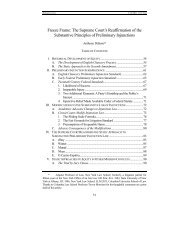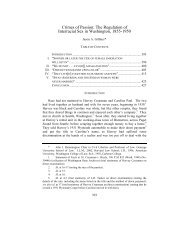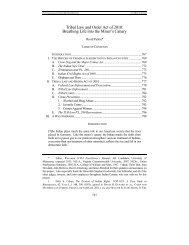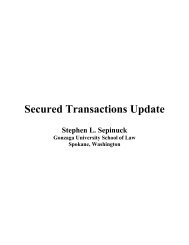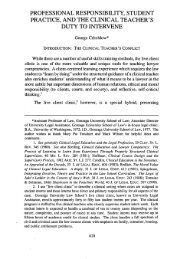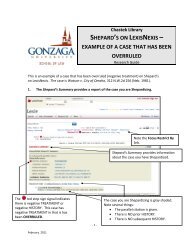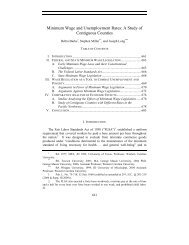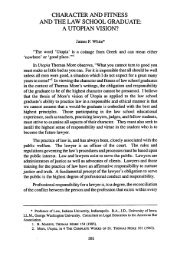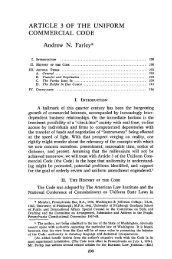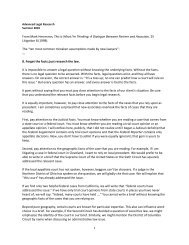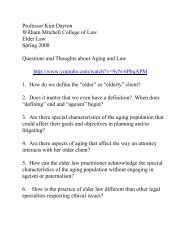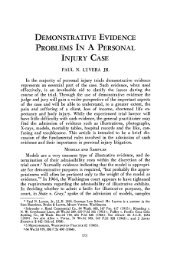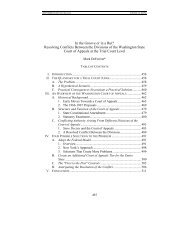I Developments in Washington's Law of Law-Making - Gonzaga ...
I Developments in Washington's Law of Law-Making - Gonzaga ...
I Developments in Washington's Law of Law-Making - Gonzaga ...
Create successful ePaper yourself
Turn your PDF publications into a flip-book with our unique Google optimized e-Paper software.
2008/09]<br />
WASHINGTON'S LAW OF LAW-MAKING<br />
ability to enact emergency legislation-<strong>in</strong> other words, legislation that could take<br />
effect immediately. For most acts, former article II, section 31467 established a 90-<br />
day wait before the law could take effect.<br />
The fiamers based this section on other states' constitutions, 468 presumably<br />
aware that many state constitutions specifically addressed the issue <strong>of</strong> laws' effective<br />
dates. Early state constitutions addressed effective dates for two reasons: 1) to avoid<br />
any ambiguity aris<strong>in</strong>g from the lack <strong>of</strong> a settled American effective date rule; 469 and<br />
2) to set a public policy balance between the public's right to be <strong>in</strong>formed <strong>of</strong> the law<br />
before it takes effect, on the one hand, and certa<strong>in</strong>ty <strong>of</strong> the law, on the other. 4 70<br />
Many state constitutions <strong>in</strong>cluded similar "fixed wait" restrictions on effective<br />
dates, with some variance <strong>in</strong> both the length <strong>of</strong> the wait and the date from which the<br />
wait is calculated (e.g., date <strong>of</strong> adjournment or date <strong>of</strong> enactment). 47 ' The wait<br />
requirement allows time for corrections to the statutes by the lawmakers<br />
472<br />
themselves. It also provides the public with time to learn <strong>of</strong> the new law and to<br />
adjust to its requirements. 473 (In contrast to the "fixed wait" requirements are<br />
"promulgation" requirements found particularly <strong>in</strong> older constitutions. 47 4 ) The fixed<br />
467. WASH. CoNsT. art. H, § 31 (repealed by amendment 7 <strong>in</strong> 1912 ) ("No law, except<br />
appropriation bills, shall take effect until n<strong>in</strong>ety days after the adjournment <strong>of</strong> the session at which it<br />
was enacted, unless <strong>in</strong> case <strong>of</strong> an emergency (which emergency must be expressed <strong>in</strong> the preamble or<br />
<strong>in</strong> the body <strong>of</strong> the act) the legislature shall otherwise direct by a vote <strong>of</strong> two-thirds <strong>of</strong> all the members<br />
elected to each house; said vote to be taken by yeas and nays and entered on the journals."); see<br />
Rosenow, supra note 3, at 548 (sources <strong>of</strong> art. I1 sec. 31 text).<br />
468. Rosenow, supra note 3, at 548 & n. 58 (referenc<strong>in</strong>g Tex. CoNsT. art. 3, § 39 (orig<strong>in</strong>al);<br />
ORE. CoNsT. art. 4, § 28; COLO. CONST. art. 5, § 19 (orig<strong>in</strong>al) and MICH. CONST. art. 4, § 20).<br />
469. SUTHERLAND, supra note 242, § 106, at 126-27. In English common law, a statute was<br />
considered effective as <strong>of</strong> the first day <strong>of</strong> the Parliament at which it was enacted. Joseph E. Murphy,<br />
The Duty <strong>of</strong> the Government to Make the <strong>Law</strong> Known, 51 FORDHAM L. REv. 255, 258 (1982);<br />
SUTHERLAND, supra note 242, § 105, at 126. In 1793, to correct the "great and manifest <strong>in</strong>justice" <strong>of</strong><br />
this retroactivity, Parliament replaced the common-law rule with a statute which declared that all<br />
statutes took effect on the date <strong>of</strong> their enactment unless another date was specified. United States v.<br />
Casson, 434 F.2d 415,418-19 (D.C. Cir. 1970). 33 Geo. 1H ch. 13, at 304 (1793); see Murphy, supra<br />
note 469, at 257-58; see also COOLEY, supra note 36, at 187. In the absence <strong>of</strong> a similar statute<br />
enacted by Congress, federal courts used the English statutory rule to make American common law:<br />
acts take effect upon their approval by the President. Casson, 434 F.2d at 418-20 (<strong>in</strong>dicat<strong>in</strong>g that<br />
while fractions <strong>of</strong> days were not recognized, <strong>in</strong> a crim<strong>in</strong>al case the ex post facto prohibition might<br />
prevent application <strong>of</strong> a law to a time prior to its actual approval).<br />
470. SuTHERLAND,supra note 242, §§ 104,108, at 124-25, 129-30.<br />
471. Murphy, supra note 469, at 273-74.<br />
472. Id. at 275. At statehood, the Wash<strong>in</strong>gton legislature lacked the ability to call itself <strong>in</strong>to<br />
special session. If an error <strong>in</strong> an act were discovered dur<strong>in</strong>g the 90-day delay, the governor would<br />
have had to call a special session <strong>of</strong> the legislature to correct the problem. WASH. CONST. art. I1, § 12<br />
(orig<strong>in</strong>al); art. II, § 7.<br />
473. Murphy, supra note 469, at 275; see also COOLEY, supra note 36, at 87-88.<br />
474. SUTHERLAND, supra note 242 § 109, at 130-31. For example, Wiscons<strong>in</strong>'s orig<strong>in</strong>al<br />
constitution declared that "no general law shall be <strong>in</strong> force until published." Wis. CoNsT. art. VII, §



